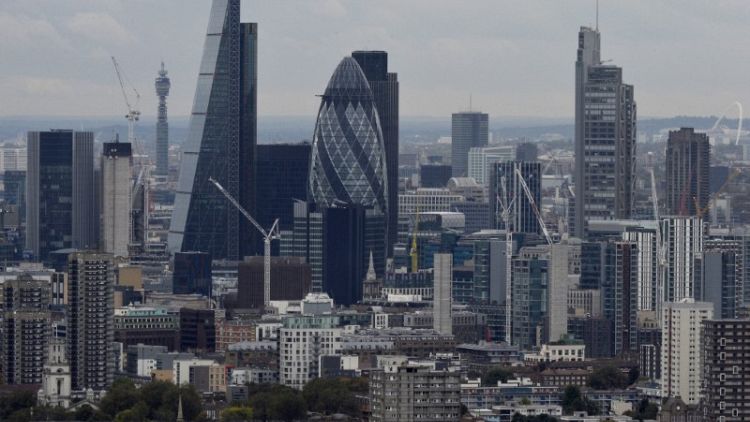By David Milliken
LONDON (Reuters) - Britain's large services industry grew last month at its fastest rate since October, a survey showed on Wednesday, prompting investors to increase bets that the Bank of England will raise interest rates next month.
After a weak first four months of 2018, the IHS Markit/CIPS services Purchasing Managers' Index (PMI) rose to 55.1 in June, easily beating economists' average forecasts in a Reuters poll of 54.0, unchanged from May's reading.
June surveys this week for the smaller manufacturing and construction sectors also beat expectations.
Taken together, the three PMIs point to overall economic growth of 0.4 percent in the second quarter, double the pace of the first, IHS Markit said.
Sterling rallied and British government bond yields rose as financial markets priced in a greater chance that the Bank of England will raise interest rates to 0.75 percent from the 0.5 percent they have stood at for most of the past decade.
In May, the BoE postponed a widely-expected rate hike after the economy slowed more than forecast in the three months to March, due in part to unusually harsh winter weather.
High inflation and continuing deep uncertainty about the terms Britain's departure from the European Union in March 2019 have acted as underlying drags on growth.
The central bank also said in May that in the event of a recovery, rates were likely to rise for only the second time in more than a decade as part of a gradual move away from the emergency stimulus programme it rolled out during the financial crisis.
"These PMIs - the last before the Monetary Policy Committee finalise their August 2 decision - are consistent with a robust second-quarter rebound, and keep our call for an August hike on track," Morgan Stanley economist Jacob Nell said.
SPEND WHILE THE SUN SHINES?
Last month BoE chief economist Andy Haldane joined two other members of the BoE's nine-strong Monetary Policy Committee in calling for a rate rise, and data was revised to show the first-quarter slowdown was less severe than first thought.
The BoE has forecast 0.4 percent GDP growth for the second quarter and also expects inflation to pick up in the coming months due to higher oil prices.
Wednesday's survey backed up the BoE's view, showing service firms contending with higher wage and fuel costs and overall input costs rising at the fastest pace since September 2017.
New business flowed in at the fastest rate in just over a year, with firms registering a boost to consumer spending from unusually warm weather.
But expectations among businesses for the next 12 months -- during which Britain is due to leave the EU -- were below their average for the years since the financial crisis, with Brexit-related uncertainty to blame, IHS Markit said.
Britain cannot yet count on a transitional EU trade deal for the period immediately after Brexit, which means firms cannot rule out border disruptions after March.
"Such a divergence between current and expected future activity stokes worries that the upturn is being fuelled by short-term spending ... and likely masks a lack of longer-term business investment," IHS Markit economist Chris Williamson said.
Euro zone PMI data on Wednesday showed businesses in the bloc at their gloomiest since late 2016, despite activity growing at its fastest in four months, reflecting concerns about a possible trade war with the United States.
(Reporting by David Milliken; editing by John Stonestreet)



